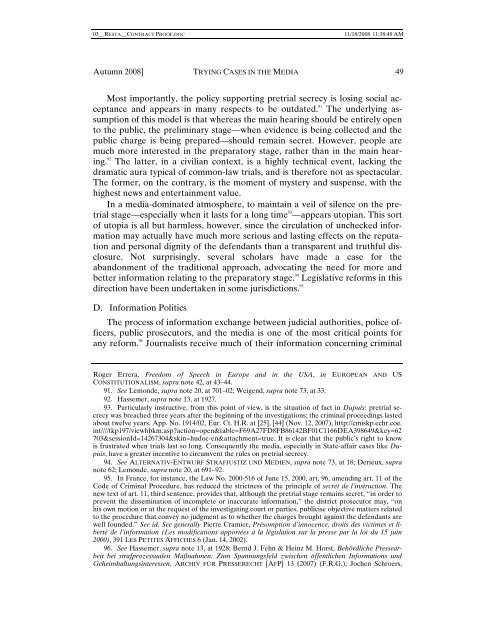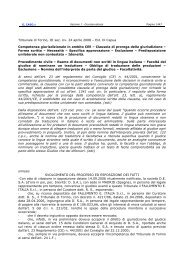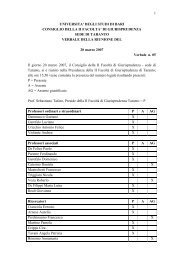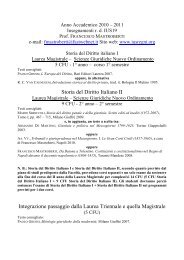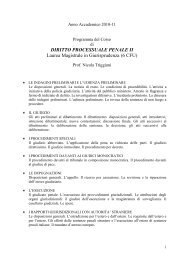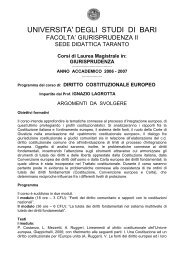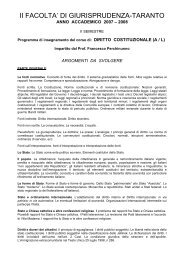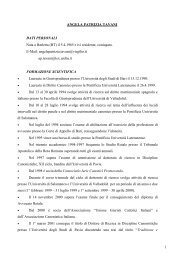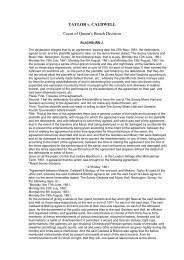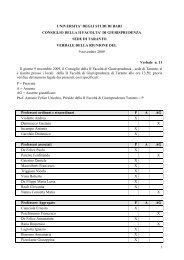TRYING CASES IN THE MEDIA: A COMPARATIVE OVERVIEW
TRYING CASES IN THE MEDIA: A COMPARATIVE OVERVIEW
TRYING CASES IN THE MEDIA: A COMPARATIVE OVERVIEW
Create successful ePaper yourself
Turn your PDF publications into a flip-book with our unique Google optimized e-Paper software.
03__RESTA__CONTRACT PROOF.DOC11/18/2008 11:38:48 AMAutumn 2008] <strong>TRY<strong>IN</strong>G</strong> <strong>CASES</strong> <strong>IN</strong> <strong>THE</strong> <strong>MEDIA</strong> 49Most importantly, the policy supporting pretrial secrecy is losing social acceptanceand appears in many respects to be outdated. 91The underlying assumptionof this model is that whereas the main hearing should be entirely opento the public, the preliminary stage—when evidence is being collected and thepublic charge is being prepared—should remain secret. However, people aremuch more interested in the preparatory stage, rather than in the main hearing.92The latter, in a civilian context, is a highly technical event, lacking thedramatic aura typical of common-law trials, and is therefore not as spectacular.The former, on the contrary, is the moment of mystery and suspense, with thehighest news and entertainment value.In a media-dominated atmosphere, to maintain a veil of silence on the pretrialstage—especially when it lasts for a long time 93 —appears utopian. This sortof utopia is all but harmless, however, since the circulation of unchecked informationmay actually have much more serious and lasting effects on the reputationand personal dignity of the defendants than a transparent and truthful disclosure.Not surprisingly, several scholars have made a case for theabandonment of the traditional approach, advocating the need for more andbetter information relating to the preparatory stage. 94 Legislative reforms in thisdirection have been undertaken in some jurisdictions. 95D. Information PoliticsThe process of information exchange between judicial authorities, police officers,public prosecutors, and the media is one of the most critical points forany reform. 96 Journalists receive much of their information concerning criminalRoger Errera, Freedom of Speech in Europe and in the USA, in EUROPEAN AND USCONSTITUTIONALISM, supra note 42, at 43–44.91. See Lemonde, supra note 20, at 701–02; Weigend, supra note 73, at 33.92. Hassemer, supra note 13, at 1927.93. Particularly instructive, from this point of view, is the situation of fact in Dupuis: pretrial secrecywas breached three years after the beginning of the investigations; the criminal proceedings lastedabout twelve years. App. No. 1914/02, Eur. Ct. H.R. at [25], [44] (Nov. 12, 2007), http://cmiskp.echr.coe.int////tkp197/viewhbkm.asp?action=open&table=F69A27FD8FB86142BF01C1166DEA398649&key=62703&sessionId=14267304&skin=hudoc-en&attachment=true. It is clear that the public’s right to knowis frustrated when trials last so long. Consequently the media, especially in State-affair cases like Dupuis,have a greater incentive to circumvent the rules on pretrial secrecy.94. See ALTERNATIV-ENTWURF STRAFJUSTIZ UND MEDIEN, supra note 73, at 18; Derieux, supranote 62; Lemonde, supra note 20, at 691–92.95. In France, for instance, the Law No. 2000-516 of June 15, 2000, art. 96, amending art. 11 of theCode of Criminal Procedure, has reduced the strictness of the principle of secret de l’instruction. Thenew text of art. 11, third sentence, provides that, although the pretrial stage remains secret, “in order toprevent the dissemination of incomplete or inaccurate information,” the district prosecutor may, “onhis own motion or at the request of the investigating court or parties, publicise objective matters relatedto the procedure that convey no judgment as to whether the charges brought against the defendants arewell founded.” See id. See generally Pierre Cramier, Présomption d’innocence, droits des victimes et libertéde l’information (Les modifications apportées à la législation sur la presse par la loi du 15 juin2000), 391 LES PETITES AFFICHES 6 (Jan. 14, 2002).96. See Hassemer, supra note 13, at 1928; Bernd J. Fehn & Heinz M. Horst, Behördliche Pressearbeitbei strafprozessualen Maßnahmen: Zum Spannungsfeld zwischen öffentlichen Informations undGeheimhaltungsinteressen, ARCHIV FÜR PRESSERECHT [AFP] 13 (2007) (F.R.G.); Jochen Schroers,


